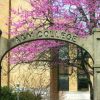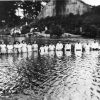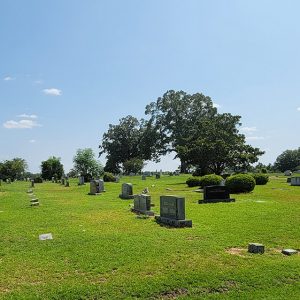calsfoundation@cals.org
Ben Elrod (1930–2018)
Ben Moody Elrod was a prominent educational and civic leader in the latter part of the twentieth century. A minister, fundraiser, and educator dedicated to expanding students’ worldview, he played a central role in the growth and development of what is now Ouachita Baptist University (OBU).
Ben M. Elrod was born on October 13, 1930, in Rison (Cleveland County). The second son of Searcy Elrod and Frances Sadler Elrod, he got his early education in Rison, but beginning at age fifteen he spent part of two years serving as a page in the U.S. House of Representatives. It was during his time in Washington DC that he first felt called to the ministry. After returning to Rison in time to graduate from the local high school, he decided to pursue his education at Ouachita Baptist College (now OBU).
Ben Elrod graduated from Ouachita Baptist in 1952, with a major in history and minor in political science. An ordained minister, following his graduation from Ouachita, he went on to earn a doctoral degree from Southwestern Seminary in Fort Worth, Texas.
Elrod and his wife, Betty, were married in the summer of 1951; they had two children.
Elrod served as a minister for a decade, beginning with his time as pastor at the First Baptist Church in Atkins (Pope County), from 1953 to 1955. Then he moved to the First Baptist Church in Tioga, Texas, where he remained until 1957. From 1957 until 1960, Elrod was the pastor at First Baptist Church in Marlow, Oklahoma, and then in 1960 he returned to Arkansas to assume the leadership of South Side Baptist Church in Pine Bluff (Jefferson County). In 1963, he left to accept the position of vice president for development at his alma mater, Ouachita Baptist, which was facing some tough financial challenges.
For five years at Ouachita Baptist, he did much to strengthen the school’s finances. Recognizing the administrative direction his career was taking, he left Ouachita in 1968 to attend Indiana University in Bloomington in pursuit of a second doctorate, this one in educational administration.
He received an offer to serve as president of Oakland City College, a small church-based institution in southwest Indiana, at the same time that he was pursing his degree. Although Oakland City was ninety miles from Bloomington, Elrod decided to accept the offer, as he needed the income and the experience. Although he was there for only two years, he made a positive impact on the struggling school, increasing applications and adding 600 names to its donor list.
As he finished his work at Indiana University, Elrod was presented with three professional options. Oakland City wanted him to stay on as president, William Jewell College in Missouri was interested in his assuming its presidency, and Ouachita wanted him to return, as the new president, Daniel Grant, the son of the Ouachita president when Elrod was himself a student, hoped that Elrod would again oversee fundraising. In what he later called the toughest decision of his life, Elrod chose to return to Ouachita, and so in 1970 he began a second stint at his alma mater, serving as vice president for development. Elrod raised millions of dollars, financing a new field house, a new fine arts center, and a new student center, among other undertakings.
In 1978, Georgetown College in Kentucky offered him its presidency, a position he assumed that summer. In his five years at Georgetown College, Elrod worked to repair relations between the Baptist Church and the college, while also helping straighten out the school’s finances. He oversaw a major capital campaign that financed a renovation of the college’s gymnasium, while also increasing the endowment.
In 1983, he returned to Arkansas to head the organization now known as Arkansas’ Independent Colleges and Universities (AICU). During his five years as head of AICU, he also served as a fundraising consultant to a number of colleges and universities. In the fall of 1988, Elrod returned to OBU, succeeding Daniel R. Grant to become the university’s thirteenth president.
OBU experienced substantial growth during Elrod’s presidency. He phased out the university’s graduate program in order to focus on the undergraduate program, and the undergraduate enrollment increased by over thirty percent during his tenure, reaching record highs. Building upon the work of his predecessor, Elrod put a new emphasis on international education. Elrod also oversaw a campus make-over, which included the building of multiple new residence halls, a new performing arts center, the Tiger Den, a new science center, the Katie Speer Pavilion and Gardens, and the International Flag Plaza. In addition, almost every other major building underwent a substantive renovation. The endowment doubled, and alumni giving increased from ten percent to more than thirty percent. In addition, the university was included in U.S. News & World Report’s “Best Value” rankings on multiple occasions. The Daniel Grant International Studies Program was expanded to include opportunities in twelve countries, while the number of international students enrolled at OBU grew from ten in 1988 to just under ninety in 1997. Upon the announcement of his retirement in 1997, Elrod was named the university’s first chancellor by the board of trustees.
Elrod had served on the Arkadelphia Chamber of Commerce while at OBU and as president of the Rotary Club. After his retirement, Governor Mike Huckabee appointed Elrod to the Arkansas Economic Development Commission.
Elrod died on August 7, 2018. He is buried in Greenwood Cemetery in Rison.
For additional information:
“A Brief History of Ouachita.” Ouachita Baptist University. https://www.obu.edu/about/history/ (accessed October 17, 2018).
Nelson, Rex, and Ian Cosh. Giving Until It Feels Good: Ben M. Elrod: Arkansas Educator and Fundraiser. Bloomington, IN: WestBow Press, 2016.
William H. Pruden III
Ravenscroft School



 Greenwood Cemetery
Greenwood Cemetery 



Comments
No comments on this entry yet.